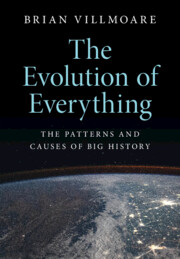Book contents
- The Evolution of Everything
- The Evolution of Everything
- Copyright page
- Contents
- Figure Credits
- Acknowledgments
- Chapter 1: Introduction
- Part I Introduction to the Scientific Perspective on the Past
- Part II Science and History
- Chapter 16: The Neolithic
- Chapter 17: States and Nations
- Chapter 18: Religion and Philosophy
- Chapter 19: The Enlightenment
- Chapter 20: The Industrial Revolution
- Chapter 21: Economics
- Chapter 22: Globalism
- Chapter 23: Modernity
- Chapter 24: Prospects for the Future
- Additional Readings
- Index
Chapter 23: - Modernity
from Part II - Science and History
Published online by Cambridge University Press: 03 November 2022
- The Evolution of Everything
- The Evolution of Everything
- Copyright page
- Contents
- Figure Credits
- Acknowledgments
- Chapter 1: Introduction
- Part I Introduction to the Scientific Perspective on the Past
- Part II Science and History
- Chapter 16: The Neolithic
- Chapter 17: States and Nations
- Chapter 18: Religion and Philosophy
- Chapter 19: The Enlightenment
- Chapter 20: The Industrial Revolution
- Chapter 21: Economics
- Chapter 22: Globalism
- Chapter 23: Modernity
- Chapter 24: Prospects for the Future
- Additional Readings
- Index
Summary
Modernity started with Darwin and probably reached its philosophical peak with Einstein. The appearance of modernity is associated with the rise of science as a dominant source of philosophical authority, and worldwide recognition of the rights of citizens, particularly women (the vote, birth control, etc.). For the first time, the orientation of philosophy was towards the future rather than the past, and ancient sources of knowledge, authority, and wisdom, were challenged. Some countries (e.g. Turkey under Ataturk) abandoned their past almost overnight. However, this is also the period of time when there were multiple challenges to the modern world view (based on democracy, the rights of citizens, and science). Religious reactionaries explicitly rejected modernity, whether it be in the form of creationist challenges to Darwinism or suppression of the burgeoning rights of women by the three monotheistic Abrahamic religions. Also, democracy as a model for government was challenged by fascism in the middle of the twentieth century, culminating in the mid-century wars of modernity: the Spanish Civil War and World War II. This chapter reviews the example of modern China, where the current government accepts some parts of traditional Western modernity while rejecting others.
Keywords
- Type
- Chapter
- Information
- The Evolution of EverythingThe Patterns and Causes of Big History, pp. 360 - 390Publisher: Cambridge University PressPrint publication year: 2022

